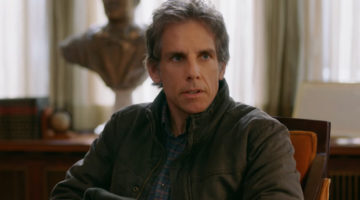Interview: Navot Papushado chats about Big Bad Wolves
For all its blood, grittiness, terror, and suspense, Big Bad Wolves is still something much more, and something especially important.
The thriller by the writing and directing duo of Navot Papushado and Aharon Keshales made a feel that is both personally relevant and cultural significant. Both born in Israel, the creative partners that met in school (Keshales was Papushado’s professor) made the exact film they set out to create: one influenced by the 80s and 90s American films they grew up on, as well focused on an upbringing that is Israeli and even Jewish.
“We wanted it to be entertaining and very cinematic, a rollercoaster ride, but it also has to be us. It has to be Israeli, something about ourselves and how we grew up,” said Papushado during an interview from Tel Aviv. “We all have a military background in Israel. Growing up, our fathers were like superheroes. They were going to war, coming back, and sometimes they would let us touch a part of their rifle. It’s a militaristic, male-dominated society, with superhero dads serving in war.”
“We’re born into a certain atmosphere, a certain reality that what you to be a warrior.”
The upbringing adds another layer to Big Bad Wolves, a film that not unlike Canada’s recent Prisoners, finds two men who take justice into their own hands when they imprison and torture another man they suspect of being a pedophile and murderer. The father of a missing girl takes the suspect to his basement in his isolated cabin, while a rogue cop joins in on the madness as well.
“There’s an importance of family, of protecting kids,” added Papushado. “We’ve a survival instinct.”
The film centers on the three men, a concerted effort by the directors to exclude women in the film. “We wanted to portray the macho society. Everyone has a military background, everyone knows their way around guns, they know torture technique, and they think they can take justice into their own hands.”
Papushado said jokingly that had a female appeared, a grandmother perhaps, she would put an end to everything and the film would be done. While it is by no means a feminist film, it’s a commentary on the state of male dominance in their culture.
It’s also no coincidence the way in which Arabs are portrayed in the film. There are two Arab stereotypes in Israeli film, says Papushado: one is the victim of Israeli violence, and the other is the terrorist. In Big Bad Wolves, the lone Arab is seen riding a horse, a man of measure and generosity, who spends time with one character sharing a cigarette and later helping another.
“It’s a very important representation,” explained Papushado. “The cabin is in the middle of Arab territories, and here are the Israelis doing terrible things to each other. It’s our metaphor.”
So, while there is plenty of meaning, and some very dark humor (all of the actors, Papushado mentioned, are comedians as well, as sly Jewish wit can be found peppered throughout the film), Big Bad Wolves is still an entertaining and satisfyingly grim genre export.
“What you should know about Israeli cinema is that we are about non-entertaining films. Most are about the conflict, the situation, and the politics. Genre films are rare, if made at all. If we have a comedy once a year, it’s a big celebration.”
The pair made waves with their debut thriller Rabies, an equally dark and bloody though less refined horror. Now, the two are finding their movie playing around the globe and supported by at least one of their idols in Quentin Tarantino, who called Wolves the best film of 2013.
With pride and purpose, Papushado and Keshales offer up Big Bad Wolves, and the two young creative minds are already much sought after. They will feature in The ABCs of Death 2¸and are ready to tackle their next project, which like Wolves combines their love of cinema with the history and culture of their native land: a spaghetti western set in Palestine – of course.
Big Bad Wolves opens in Toronto on Jan. 17.



